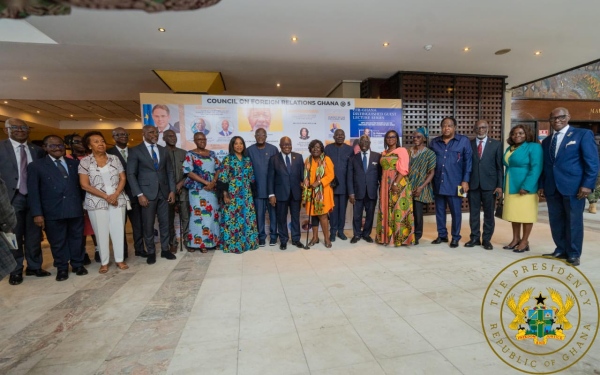President Akufo-Addo has delivered a keynote speech emphasizing the transformative potential of the African Continental Free Trade Area (AfCFTA) Agreement in driving Africa’s economic integration and industrialization.
He was speaking at the 5th anniversary celebration of the Council on Foreign Relations Ghana, on the theme “The Limits of the Current Development Co-operation Framework for Africa’s Transformation.”
The President highlighted AfCFTA as a key component of a new paradigm for development cooperation in Africa.
The AfCFTA Agreement, according to President Akufo-Addo, represents a bold and transformative initiative aimed at accelerating intra-African trade, promoting industrialization, and fostering economic integration across the continent.
He noted that the agreement seeks to create a single market for goods and services, encompassing 54 countries and over 1.3 billion people, and has the capacity to significantly boost intra-African trade.
“Enhanced economic integration can lead to economies of scale, increased competitiveness, and greater market access for African businesses,” President Akufo-Addo stated. He cited a United Nations Economic Commission for Africa (UNECA) report which projects that intra-African trade could be 34% higher by 2045 with the AfCFTA than without it.
President Akufo-Addo also highlighted the potential of the AfCFTA to drive industrialization and create decent jobs for Africa’s growing population.
He emphasised that one of the serious challenges facing Africa is the reliance on the export of raw materials with little value addition. The AfCFTA Agreement, he argued, provides an opportunity to shift towards industrialization and value addition by creating a larger market for manufactured goods and promoting regional value chains.
By encouraging investment in manufacturing and processing industries, the AfCFTA can help create jobs and drive economic growth across the continent.
“The establishment of a continental free trade area should magnify Africa’s attractiveness as an investment destination,” the President stated, adding that the implementation of the AfCFTA Agreement can create a more predictable and stable business environment, attracting both domestic and foreign investment.
In his speech, President Akufo-Addo also addressed the role of small and medium enterprises (SMEs) in Africa’s economies, noting that they contribute significantly to employment and income generation. He pointed out that SMEs often face challenges related to market access, financing, and regulatory constraints.
The AfCFTA, he argued, can provide new opportunities for SMEs by expanding their market reach and reducing trade barriers.
The President highlighted the SME Growth and Opportunity Programme he recently launched, which aims to provide targeted financing solutions and technical assistance to SMEs in Ghana. The program, he explained, is an important step towards creating a viable SME ecosystem that will empower businesses with high-growth potential to scale up and create impact across their communities.
In conclusion, President Akufo-Addo reiterated the transformative potential of the AfCFTA Agreement, stating that it represents a central component of the new paradigm for development cooperation in Africa.
He expressed confidence that by leveraging the opportunities presented by the AfCFTA, Africa can drive economic integration, industrialization, and inclusive growth, ultimately achieving the transformative change to which the continent aspires.





